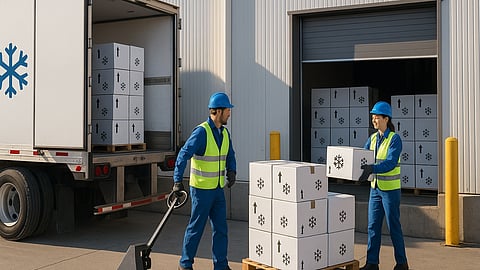Keeping It Cool: How Cold Chain Logistics Can Slash Food Waste in the Middle East
Across the Gulf, vast quantities of food never reach consumers’ plates. Despite importing up to 85% of its food, the GCC still discards an estimated one-third of what it buys. In a region where food security is a national priority, that level of waste carries a heavy cost.
Experts say one of the most effective ways to tackle the problem lies in strengthening cold chain logistics - the system that keeps food chilled from the moment it’s harvested or shipped until it’s sold or delivered.
A Hot Problem
Few places test food supply chains like the Gulf. With summer temperatures routinely topping 45°C, even short lapses in temperature control can ruin perishable goods. “You can lose an entire shipment of produce in a few hours if the cooling fails,” said a Dubai-based logistics manager.
Much of the region’s existing infrastructure wasn’t built for that reality. Some transport trucks remain non-refrigerated, and smaller distributors often rely on storage spaces without proper insulation or humidity control. That means food - particularly dairy, meat, seafood, and fresh produce -spoils long before it should.
The Case for a Cold Chain
A well-managed cold chain can dramatically cut that loss. Modern refrigerated warehouses can extend the shelf life of fruits and vegetables by days or even weeks. Temperature-controlled trucks and containers prevent spoilage on long-haul routes from ports to supermarkets.
Maersk to Boost Cold Chain Logistics Services with First Cold Storage in Dubai
Technology is helping close the gap. Logistics firms across Saudi Arabia and the UAE are adopting Internet of Things (IoT) sensors that continuously monitor temperature, alerting operators the moment conditions slip outside safe limits. In some pilot programs, these systems have reduced spoilage rates by up to 20%.
From Farm to Fork - and Every Step Between
The benefits extend beyond transport. Digital inventory systems help suppliers forecast demand more accurately, reducing overstocking.
Retailers using smart cold storage can rotate stock more efficiently, keeping older items at the front. Even at the last mile - the surge in grocery and meal delivery services across the GCC - cold chain solutions such as insulated boxes and small-scale refrigerated vans are proving essential.
Without these systems, retailers risk delivering spoiled products and losing consumer trust. With them, they not only protect their bottom line but also help curb one of the region’s most stubborn sources of waste.
Economic and Environmental Gains
Food waste costs GCC economies billions each year. In Saudi Arabia alone, roughly 33% of all food available for consumption is lost or wasted across the supply chain. It also wastes vast amounts of water, energy, and labor resources already scarce in the region.
Cold chain logistics require significant investment, but analysts argue the returns are worth it. Improved efficiency, lower waste disposal costs, and longer product shelf life all feed directly into the bottom line. The environmental upside is equally strong: less food waste means lower methane emissions from landfills.
Speaking at the groundbreaking ceremony of RSA Cold Chain's Advanced Regional Distribution Centre in Jebel Ali Free Zone in May this year, Abdulla Bin Damithan, CEO and Managing Director of DP World GCC said: "DP World is committed to strengthening the resilience of the global food supply chain.
"Through our partnerships with Americold and RSA, our global logistics solutions, and cutting-edge cold storage, together we are building a better food system that will reduce waste, lower costs, and increase efficiencies."
Policy and Progress
Governments are starting to take note. Saudi Arabia’s Vision 2030 includes plans to expand and modernize logistics infrastructure, including cold storage capacity.
The UAE has launched several smart warehousing projects and digital tracking initiatives to monitor imported food quality. Oman is developing cold chain “green corridors” linking its ports with inland markets.
Still, challenges remain. High energy costs, fragmented regulations, and a shortage of trained technicians can slow progress. Experts say a coordinated regional approach, combining investment incentives, renewable-powered cooling systems, and unified safety standards - could help scale solutions faster.
A Cooler Future
The logic is simple: every degree of cooling counts. Strengthening cold chain systems won’t solve the GCC’s food waste crisis on its own, but it’s one of the most effective tools on the table.
As food imports rise and climate pressures mount, the ability to keep products fresh from port to plate could define the region’s next phase of food security. In the world’s hottest economies, keeping it cool may be the key to keeping food on the table.
Insight: How AI, IoT, and Sustainability are Transforming Cold Chain Logistics in the GCC Region



